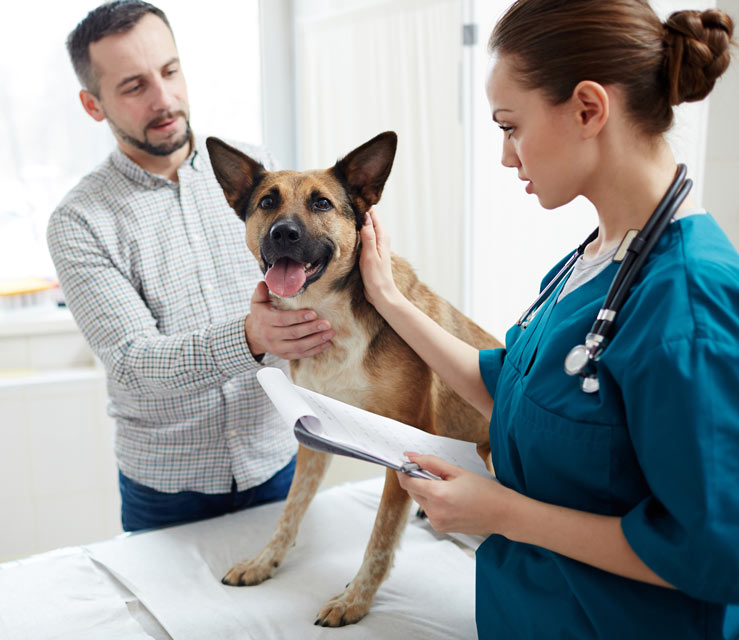Chylothorax in Dogs

Chyle is lymphatic fluid. It is a milky white fluid that's high in fat and is part of the lymphatic system, which helps drain toxins out of the body. Chylothorax is a type of pleural effusion (fluid in the space between the lungs and the chest wall) that occurs when chyle leaks out of a duct in the chest into the area around the lungs.
Causes of Chylothorax in Dogs
There are a few things that can cause disruption and leakage of the duct that carries chyle through the chest. They include:
- Heart disease (including cardiomyopathy, heartworm, and various other heart conditions)
- Trauma to the chest
- A mass or tumor in the front part of the chest
- Idiopathic (Unknown cause)
Signs of Chylothorax in Dogs
The signs that are seen when a dog has chylothorax can vary quite a bit depending on what caused the chyle to leak out in the first place.
Dogs may have chyle leaking into their pleural space for a while before they show signs. The body works to reabsorb it as much as possible, so it isn't until the system is overwhelmed that signs are apparent.
Some of the signs of chylothorax include:
- Coughing
- Labored breathing
- Fast respiratory rate
- Lethargy
- Loss of appetite
- Weight loss
- Exercise intolerance
A veterinarian might note the following signs on the physical exam:
- Muffled heart and lung sounds when listened to with a stethoscope
- Blue-tinged mucous membranes
- Irregular heartbeat
- Heart murmur
Diagnosis of Chylothorax
Many times, blood work is relatively normal when performed on dogs with chylothorax.
X-rays show pleural fluid (fluid between the lungs and chest walls). Ultrasound will also show fluid.
Removal of fluid from the chest can help the dog breathe more easily and also aid in diagnosis. The veterinarian will immediately be able to see that the fluid is milky, and under the microscope, it will have a high fat content.
Treatment of Chylothorax in Dogs
The treatment of canine chylothorax includes thoracocentesis (removal of fluid from the chest with a needle) as necessary. From there, the veterinarian will work to determine the underlying cause of the condition, so that cause can be addressed and treated. The fluid will continue to reform until the cause is fixed.
Some dogs need to have a chest tube placed for continuous fluid removal, especially in cases of trauma.
A low-fat diet may help the dog's body be able to reabsorb the chyle more easily.
Rutin is a drug that is used to treat idiopathic chylothorax in dogs. It is often needed for at least two months.
Over time, a condition called fibrosing pleuritis, which is scarring of the lungs from irritation due to the chyle, may occur. It is quite serious and negatively impacts the dog's breathing permanently.
Some cases of chylothorax in dogs may resolve on their own.
If medication does not help, surgery may be necessary to try and tie off the duct that is leaking chyle into the chest.
You May Also Like These Articles:
SLE: Systemic Lupus Erythematosus in Dogs
Disclaimer: This website is not intended to replace professional consultation, diagnosis, or treatment by a licensed veterinarian. If you require any veterinary related advice, contact your veterinarian promptly. Information at DogHealth.com is exclusively of a general reference nature. Do not disregard veterinary advice or delay treatment as a result of accessing information at this site. Just Answer is an external service not affiliated with DogHealth.com.
Notice: Ask-a-Vet is an affiliated service for those who wish to speak with a veterinary professional about their pet's specific condition. Initially, a bot will ask questions to determine the general nature of your concern. Then, you will be transferred to a human. There is a charge for the service if you choose to connect to a veterinarian. Ask-a-Vet is not manned by the staff or owners of DogHealth.com, and the advice given should not delay or replace a visit to your veterinarian.



